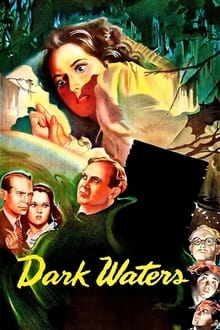
Belleville Bedlam.
Dark Waters is directed by André De Toth and collectively written by Marian B. Cockrell, Joan Harrison, Arthur Horman, John Huston and Francis M. Cockrell. It stars Merle Oberon, Franchot Tone, Thomas Mitchell, Fay Bainter, Elisha Cook Jr., John Qualen and Rex Ingram. Music is by Miklós Rózsa and cinematography by John J. Mescall and Archie Stout.
After recovering from a traumatic boat incident that saw her parents killed, Leslie Calvin (Oberon) travels to the bayous of Louisiana to stay with her next of kin. But upon arrival it quickly becomes evident that nothing is as it seems...
In 1944 Merle Oberon made two horror movies that very much relied on atmosphere and film noir visuality over any great semblance of psychological evaluation. With the far superior The Lodger rightly moving into classic territory as it boasted Laird Cregar, John Brahm and Lucien Ballard operating out of the top draw, Dark Waters, with its modest production values and second tier work force, feels like a B movie appetiser to Brahm's movie. Yet in spite of some overkill in the screenplay, there is much to enjoy here for the Gothic noir horror fan.
Dark Waters is a fascinating thriller movie, it may play its hand far too early, and it really does, but the reverse plot device of having the lady protagonist be mentally troubled at the outset - only to have her grow in mental stability as the narrative unfolds - adds a non conformist kink to the picture. De Toth and his cinematographers fill the production with a feverish like dream state that picks away at the conscious, where although the woman in peril angle is slowly drawn out, the rewards are there to be had for those who like to see the visual surroundings mirror the mental health of the central character.
The resolution, as was so often the case in olde classic movies trying to make mental health a viable issue, is cheap in the context of medicinal recovery. To that end it's a little frustrating viewing it these days to know that all we needed was some handsome/pretty cohort to get us through trauma! Yet in 1944 film makers were still trying to get to grips with a horror that didn't involve some monstrous creature moving through the landscape. There are many things wrong with Dark Waters when viewing it now, but if you can accept it as a 1944 movie and embrace it for its visual touches (and the makers do not disappoint with shadowy and spooky atmospherics), then it's a movie well worth taking an interest in. Besides which! Elisha Cook is in there being a shifty weasel, what more do you want in some Louisiana swamp based Gothic noir picture... 7/10